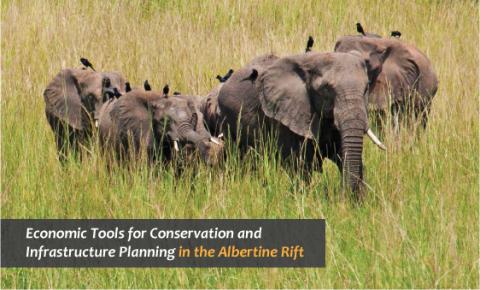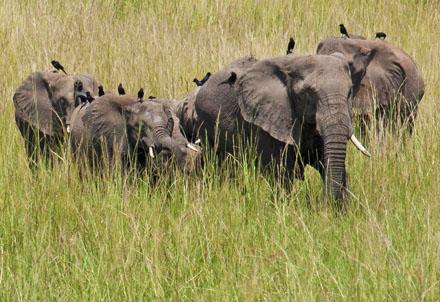
Conservation Strategy Fund held a course in Economic Tools for Conservation and Infrastructure Planning in the Albertine Rift, from June 11-22, 2012 in Uganda. This course was offered in partnership with the Ugandan National Environmental Management Agency (NEMA) and was made possible through the support of the United States Agency for International Development, the Wildlife Conservation Network, and the Handsel Foundation. We invited applications from people who work in Uganda, Rwanda, Kenya, Tanzania and the Democratic Republic of Congo.
Over the past decade, CSF courses have become recognized as premier applied economics training events for environmental professionals from around the world. During the comprehensive two-week session, participants learned to use economics to be more strategic and successful in their planning and development efforts related to infrastructure and the environment. The course covered economic fundamentals, natural resource economics, environmental valuation methods, environmental policies, communication and negotiation techniques, and hands-on experience with cost-benefit analysis. These skills are crucial at a time when integrating ecosystem conservation and infrastructure development has become an essential component of short- and long-term social and environmental well-being in the Albertine Rift.
PARTICIPANTS
This course was intended for people at the forefront of challenges related to conservation and infrastructure planning and development in the Albertine Rift. Target countries included Uganda, Rwanda, Democratic Republic of Congo, Kenya and Tanzania. Representatives from government institutions, NGO’s, CBOs, research institutions, donor agencies, businesses, and other relevant organizations involved in natural resource management, biodiversity conservation, and infrastructure development were invited to apply. This course was especially beneficial for individuals who are program officers and directors, government officers, district and economic planners, EIA practitioners, field enforcement officers, policy and financial analysts, scientists/researchers, and developers/engineers who are involved in planning and decisions around energy and infrastructure development. Participants came from a variety of disciplines such as biology, engineering, accounting, business, environmental sciences, forestry, law, anthropology, or economics. Previous training in economics was beneficial, but not necessary. It was required that participants be proficient in spoken and written English.
BENEFITS
Participants gained:
• An essential foundation in basic economic concepts and language. • Insight into the drivers of environmental problems and over-extraction of natural resources.
• The ability to formulate more effective solutions and policies for infrastructure planning and conservation.
• The ability to incorporate environmental and social costs and benefits into infrastructure development.
• Practice using communication and negotiation techniques to articulate environmental values in a language that communities, businesses, and governments can understand.
• A network of fellow infrastructure planners and environmental professionals.
• Membership in CSF's global alumni network.
Watch the video below for a glimpse into what a typical CSF Economic Tools for Conservation course is like:
COST
Selected course participants were awarded a full scholarship to participate in the course. This scholarship covered the following:
• Instruction by renowned economic experts.
• All course materials and supplies.
• Access to CSF's online course intranet with course reading and materials.
• 13 nights lodging in the Rwenzori International Hotel, Kasese, Uganda.
• All meals, coffee and snacks during the course.
• Local transportation to and from the hotel (transport provision or local transport refund).
Selected applicants were responsible for seeking their own funding from employers, government, sponsors or other sources to cover international travel expenses to Kampala.
COURSE IMPACT
Year after year, participants give CSF’s courses the highest marks in terms of content, instructors, staff and the overall course experience. Our courses also create significant and lasting impacts.
Alumni from our Economic Tools for Conservation course report that:
• The course influenced how I approach my conservation work – 95%
• The training was one of the most useful short courses I have attended – 92%
• I continue to benefit from my CSF training – 90%
"I expected to gain new skills in economic analysis and feel that I got much more than that; it was more like a fundamental paradigm shift in the way I examine environmental issues." –Leah Wahlberg, Canada
"The course gave me a broad vision of the tools of economics. We received enough knowledge to understand all the valuation and cost benefit analysis done in the 'real' world. I got all that I expected and much, much more! Coming to the CSF Course and mingling with the community and my colleagues was such a pleasant and motivating experience I can't find a way to thank you all!"
POISED FOR SUCCESS
The majority of our graduates report that their CSF Training has helped them achieve a specific conservation or sustainable development success. Here is what some of our alumni say about how how CSF's training has transformed their work and led to real conservation impact:
"When talking to local government in the Amazon, you can only make the case for conservation areas by talking about monetary values and that’s exactly what the CSF course taught me to do. It enabled me to present a more sophisticated version of my ’romantic‘ arguments about the importance of parks and reserves." –Clarice Bassi, Brazil
"The course helped me to carry out a survey on the bushmeat trade and consumption in Eastern DR Congo. Results were used by the Congolese Wildlife Authority to implement an antipoaching program." –Chifundera Kusamba, DRC "I truly believe that I have received one, if not the best piece of schooling since my University days in the UK. Perhaps my way of appreciating the excellent multi-cultural training we received is to use it, and sure like rain we are using it!" –Peter Mbile, Cameroon (CSF International Course Graduate)
PROGRAM
Microeconomics
• Market theory: Supply, demand, market equilibrium, opportunity cost and competition.
• Externalities, market failures and public goods: Why markets are inefficient when it comes to environmental protection.
• Welfare economics.
Natural Resource Economics
• Capital theory: The time value of money, interest rates and how they influence the use of natural resources.
• Public and private goods, common pool resources, property rights, management and incentives.
• Non-renewable resources: Oil and mining.
• Renewable resource extraction: Forest economics, optimal harvesting and policy options.
• Exercises and instruction focused on policy negotiation skills.
Environmental Policy
• An overview of the need for environmental policies and institutions to correct problems of externalities, market failures, and weak property rights.
• Criteria for evaluating policies
• The role of environmental policies such as command and control legislation versus economic instruments for conservation such as taxes, subsidies, and tradable permit systems.
• An overview of infrastructure planning and development policy, including financial mechanisms related to mitigation, compensation and offsets.
Environmental Valuation
• Environmental values, Total Economic Value
• Valuation methods, case studies and examples, and how these methods are best used in various countries.
• Payments for ecosystem services
Cost-Benefit Analysis
• Principles and methodologies.
• Financial, economic and distributive analysis.
• Case studies evaluating the economic feasibility of small-scale and large-scale infrastructure projects, including incorporation of externalities and sensitivity analysis.
• Analysis Tools for hydroelectric dams and road projects.
Communication
• Effective strategies for presenting economic analysis results.
INSTRUCTORS
Economic Tools for Ecosystem Conservation and Infrastructure Planning was be taught by experts in environmental economics and cost-benefit analysis who also have extensive field experience and understand real-world conservation and infrastructure planning challenges. They were drawn from Makerere University, University of Cape Town, University of Lompopo, and CSF staff, as well as from other leading academic and international institutions.


